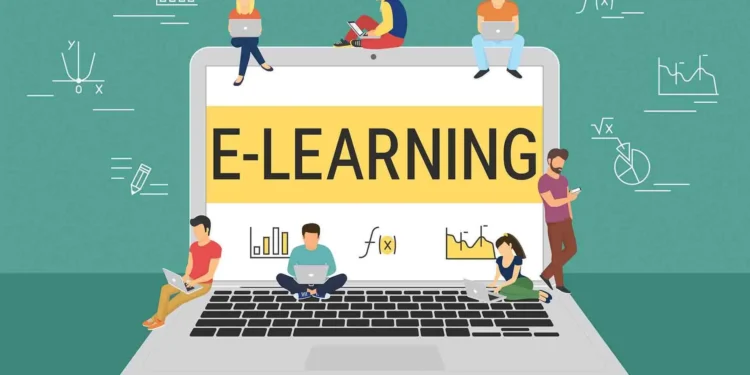Online learning has transformed the way students, professionals, and lifelong learners acquire knowledge. Whether pursuing a degree, enhancing skills, or gaining certifications, online education offers flexibility, accessibility, and a wealth of resources. However, learning online requires discipline, organization, and effective strategies to maximize engagement and retention. Without a structured approach, distractions, procrastination, and lack of motivation can hinder success.
To thrive in an online learning environment, students must develop strong study habits, time management skills, and digital literacy. Using the right tools, creating an efficient workspace, and staying motivated are key to achieving educational goals. This guide explores 70+ expert strategies, categorized into sections that cover organization, time management, engagement, motivation, collaboration, technology use, and exam preparation. By following these techniques, learners can optimize their online experience, enhance comprehension, and achieve long-term success.

Setting Up a Productive Learning Environment
A well-structured learning environment significantly impacts focus, concentration, and retention. Unlike traditional classrooms, online learners must create their distraction-free, organized, and comfortable study space. By setting up the right environment, students can enhance productivity and maintain a consistent study routine.
- Designate a dedicated learning space – A quiet, comfortable area helps minimize distractions and improves focus. Avoid studying in bed or on a couch.
- Ensure good lighting and ergonomics – A well-lit workspace with a comfortable chair and desk reduces eye strain and physical discomfort.
- Keep your study space clutter-free – Organizing materials like notebooks, pens, and reference books minimizes distractions and promotes efficiency.
- Use noise-canceling headphones if necessary – If studying in a noisy environment, noise-canceling headphones or soft background music can help concentration.
- Limit external distractions – Turn off notifications, mute phone calls, and inform family members of your study schedule to maintain focus.
- Optimize your internet connection – A stable, high-speed internet connection ensures smooth video streaming and uninterrupted participation in virtual classes.
- Use a second monitor or split-screen mode – Managing multiple screens enhances multitasking while taking notes or reviewing learning materials.
- Have necessary supplies within reach – Keep pens, notebooks, chargers, and reference books nearby to avoid interruptions.
- Adjust screen brightness and text size – Customizing your screen settings reduces eye fatigue and improves reading comfort.
- Keep water and healthy snacks nearby – Staying hydrated and eating brain-boosting snacks helps maintain focus and energy levels.
A well-designed learning environment sets the foundation for efficient studying and long-term retention. Creating a structured, distraction-free space allows students to stay motivated and perform at their best.

Developing Strong Time Management Skills
Online learning offers flexibility, but without a structured schedule, it’s easy to procrastinate and fall behind. Effective time management ensures consistent progress, reduced stress, and improved retention of learning materials.
- Create a daily or weekly study schedule – Planning study sessions in advance helps allocate sufficient time for each subject or module.
- Use a planner or digital calendar – Scheduling assignments, deadlines, and class sessions prevents last-minute cramming and missed deadlines.
- Break large tasks into smaller goals – Completing smaller sections increases motivation and prevents feeling overwhelmed.
- Prioritize important tasks first – Focus on critical assignments and difficult topics when energy levels are highest.
- Set clear start and end times for study sessions – Having a structured routine improves consistency and prevents burnout.
- Use the Pomodoro Technique – Studying for 25-50 minutes followed by short breaks improves concentration and efficiency.
- Avoid multitasking – Focusing on one task at a time enhances comprehension and reduces errors.
- Track study hours and progress – Monitoring completed lessons and assignments provides motivation and accountability.
- Learn to say no to distractions – Inform family and friends about study commitments to avoid unnecessary interruptions.
- Review and adjust schedules regularly – Assess progress and adjust study plans if necessary to stay on track.
Time management is critical for balancing coursework, assignments, and personal responsibilities. By implementing these strategies, online learners can maintain steady progress without unnecessary stress.

Enhancing Engagement and Active Learning
Engagement is essential for deep learning and long-term retention. Passive learning—such as watching lectures without interaction—reduces comprehension. Active learning techniques improve critical thinking and make studying more enjoyable.
- Take notes while watching lectures – Writing key points reinforces understanding and aids recall.
- Summarize lessons in your own words – Rewriting content in a simplified format improves comprehension.
- Use mind maps and diagrams – Visual representations help organize complex information and highlight relationships between concepts.
- Ask questions during or after lessons – Engaging in discussions clarifies doubts and reinforces learning.
- Participate in online forums or study groups – Collaborative learning provides diverse perspectives and enhances critical thinking.
- Use real-world applications for concepts learned – Connecting lessons to practical scenarios makes learning more meaningful.
- Teach the material to someone else – Explaining concepts solidifies understanding and exposes knowledge gaps.
- Engage in interactive learning activities – Utilize quizzes, flashcards, and simulations to reinforce concepts.
- Listen to related podcasts or audiobooks – Different formats enhance retention and deepen understanding.
- Use gamified learning platforms – Apps that reward progress with points and challenges improve engagement.
Active engagement prevents passive learning fatigue and encourages higher levels of understanding and retention. Applying these strategies helps learners absorb and retain information effectively.

Staying Motivated and Avoiding Burnout
Motivation is crucial for staying on track and maintaining momentum in online learning. Without proper strategies, learners may feel disconnected, demotivated, or overwhelmed.
- Set specific and achievable learning goals – Clearly defined objectives create a sense of purpose and direction.
- Celebrate small milestones and progress – Recognizing achievements boosts confidence and motivation.
- Maintain a positive mindset – Viewing challenges as opportunities for growth fosters resilience.
- Find an accountability partner – Studying with a friend increases commitment and reduces procrastination.
- Reward yourself after completing tasks – Small incentives increase motivation and maintain consistency.
- Take regular breaks to refresh focus – Overstudying leads to burnout and decreased productivity.
- Stay physically active and practice self-care – Exercise and mindfulness improve mental clarity and energy levels.
- Engage with instructors and classmates – Building connections creates a supportive learning community.
- Change study environments occasionally – A new setting reduces monotony and increases focus.
- Visualize long-term success and benefits – Keeping the end goal in mind sustains motivation during difficult times.
Staying motivated ensures consistent progress and prevents burnout. By applying these strategies, learners can maintain enthusiasm and achieve their educational goals.

Improving Online Collaboration and Communication
Effective collaboration and communication play a vital role in online learning. Unlike traditional classrooms, online courses require students to engage in virtual discussions, group projects, and networking opportunities. Without proper communication skills, learners may struggle to express ideas, misunderstand assignments, or feel disconnected from peers and instructors. By developing strong digital communication skills, students can build meaningful connections, enhance teamwork, and maximize their learning experience.
- Actively participate in discussion boards – Engaging in online forums improves understanding and fosters intellectual discussions.
- Use video conferencing tools for group projects – Platforms like Zoom and Microsoft Teams help improve virtual collaboration and teamwork.
- Be respectful and professional in online discussions – Using clear, polite, and constructive language enhances communication and builds relationships.
- Ask for clarification when needed – If instructions are unclear, reaching out to instructors or classmates prevents misunderstandings.
- Keep responses concise and relevant – Writing clear and to-the-point messages improves engagement and avoids confusion.
- Use collaboration tools like Google Docs and Trello – These platforms streamline teamwork, project management, and task tracking.
- Provide constructive feedback to peers – Offering thoughtful insights encourages productive discussions and strengthens learning communities.
- Practice active listening during virtual meetings – Giving full attention to lecturers and classmates enhances comprehension.
- Be mindful of time zones in global courses – Scheduling study sessions at convenient times ensures effective communication across different locations.
- Engage with instructors through emails and office hours – Taking initiative in communicating shows commitment and strengthens relationships with educators.
Strong online communication skills enhance collaboration, reduce misunderstandings, and create a supportive learning environment. By staying engaged, responsive, and professional, students can make the most out of their virtual classroom interactions.

Utilizing Technology and Digital Tools for Success
Technology is the backbone of modern online education, providing students with access to learning management systems, study aids, and digital collaboration tools. Leveraging these technologies effectively enhances comprehension, boosts productivity, and streamlines coursework management. However, with so many digital resources available, students must know which tools to use and how to integrate them into their learning routine.
- Familiarize yourself with your Learning Management System (LMS) – Platforms like Moodle, Blackboard, and Canvas host assignments, resources, and discussions.
- Use digital note-taking apps like OneNote and Evernote – Organizing notes electronically makes reviewing and searching for information easier.
- Record lectures (with permission) for later review – Revisiting recorded lessons reinforces key concepts and aids retention.
- Use transcription tools for better note-taking – Apps like Otter.ai and Descript convert spoken lectures into written transcripts for easier studying.
- Set up email filters for course-related messages – Sorting emails into folders keeps coursework and instructor updates organized.
- Use cloud storage for backup – Saving documents in Google Drive or Dropbox prevents loss of important study materials.
- Explore digital flashcard apps like Anki or Quizlet – These tools boost memorization and active recall through spaced repetition.
- Use distraction-blocking apps during study sessions – Apps like Forest and Freedom help maintain focus by blocking social media and distractions.
- Try speed-reading apps for faster comprehension – Software like Spreeder trains your brain to read and absorb content quickly.
- Use text-to-speech tools for multitasking – Listening to study materials while commuting or exercising enhances learning efficiency.
By integrating digital tools and online resources into their study habits, students can enhance organization, improve retention, and optimize their overall learning experience.

Preparing for Exams and Assessments in Online Learning
Exams and assessments are crucial components of online learning, testing students’ knowledge, critical thinking, and application of concepts. Unlike traditional classroom exams, online assessments often require self-discipline, independent study strategies, and effective time management. Preparing efficiently ensures better performance, reduced stress, and improved confidence.
- Review course objectives before studying – Understanding what will be tested helps prioritize key concepts.
- Create a revision schedule weeks in advance – Planning ahead prevents last-minute cramming and improves retention.
- Take practice tests to assess understanding – Mock exams help identify weak areas and improve test-taking strategies.
- Use the Feynman Technique to explain concepts – Teaching difficult topics in simple terms enhances comprehension.
- Simulate real test conditions during practice – Taking timed quizzes in a quiet space improves exam readiness.
- Organize study groups for collaborative learning – Discussing topics with peers reinforces knowledge and boosts motivation.
- Use different study techniques for different subjects – Apply mnemonics for memorization, problem-solving for math, and storytelling for history.
- Take breaks to avoid burnout while studying – Short breaks help maintain focus and prevent fatigue.
- Check technical requirements before online exams – Ensuring a stable internet connection and functional webcam prevents disruptions.
- Stay calm and well-rested before the test – Proper sleep and relaxation enhance memory recall and performance.
By adopting effective exam preparation strategies, online learners can approach assessments with confidence and achieve academic success.

Overcoming Common Challenges in Online Learning
Despite its many advantages, online learning comes with its own set of challenges. Students often struggle with a lack of motivation, technical issues, time mismanagement, and feelings of isolation. However, these obstacles can be overcome with the right mindset, strategies, and digital tools. By addressing these challenges proactively, learners can stay on track, maintain productivity, and achieve success in online education.
- Combat procrastination with accountability partners – Studying with a friend or mentor keeps you responsible and reduces distractions.
- Set daily learning intentions – Before starting a session, outline specific objectives to create focus and direction.
- Develop self-discipline with scheduled breaks – Structuring study periods with planned rest times prevents fatigue and enhances concentration.
- Improve self-motivation with a rewards system – Rewarding yourself after completing a lesson keeps you engaged and excited to learn.
- Manage screen fatigue with the 20-20-20 rule – Every 20 minutes, look at something 20 feet away for 20 seconds to reduce eye strain.
- Use stress management techniques – Practicing deep breathing, meditation, or light exercise can help reduce anxiety related to online coursework.
- Stay socially connected through virtual study groups – Engaging in online communities prevents isolation and enhances peer learning.
- Find a balance between screen time and offline activities – Mixing digital study with handwritten notes or printed resources can reduce mental fatigue.
- Adapt to technical challenges with backup plans – Keeping alternative devices, internet sources, or downloading materials offline ensures learning continuity.
- Reflect on learning progress weekly – Reviewing achievements and identifying areas for improvement boosts confidence and self-awareness.
Overcoming challenges in online learning requires self-awareness, adaptability, and proactive strategies. By implementing these techniques, learners can turn obstacles into opportunities and continue making steady progress toward their goals.

Effective online learning goes beyond attending virtual classes—it requires discipline, planning, engagement, and resilience. By applying these 80+ expert strategies, students can create productive study habits, maximize retention, and navigate challenges with confidence.
✅ Creating an optimized learning environment enhances concentration and efficiency.
✅ Mastering time management techniques prevents procrastination and improves productivity.
✅ Engaging actively with study materials boosts comprehension and critical thinking.
✅ Maintaining motivation and avoiding burnout leads to long-term success.
✅ Leveraging digital tools and technology enhances learning experiences and organization.
✅ Developing strong communication and collaboration skills strengthens online interactions.
✅ Adapting to challenges with problem-solving strategies ensures continuous learning progress.
Online learning empowers students, professionals, and lifelong learners with flexible access to education, but success depends on self-discipline, perseverance, and adopting the right strategies. By integrating these techniques into daily routines, learners can stay engaged, motivated, and fully equipped to achieve their academic and professional goals.
No matter where you are on your educational journey, these strategies will help you thrive in the world of digital learning, turning challenges into opportunities and knowledge into success.










